Active Citizenship: Civil society outlooks on 2020
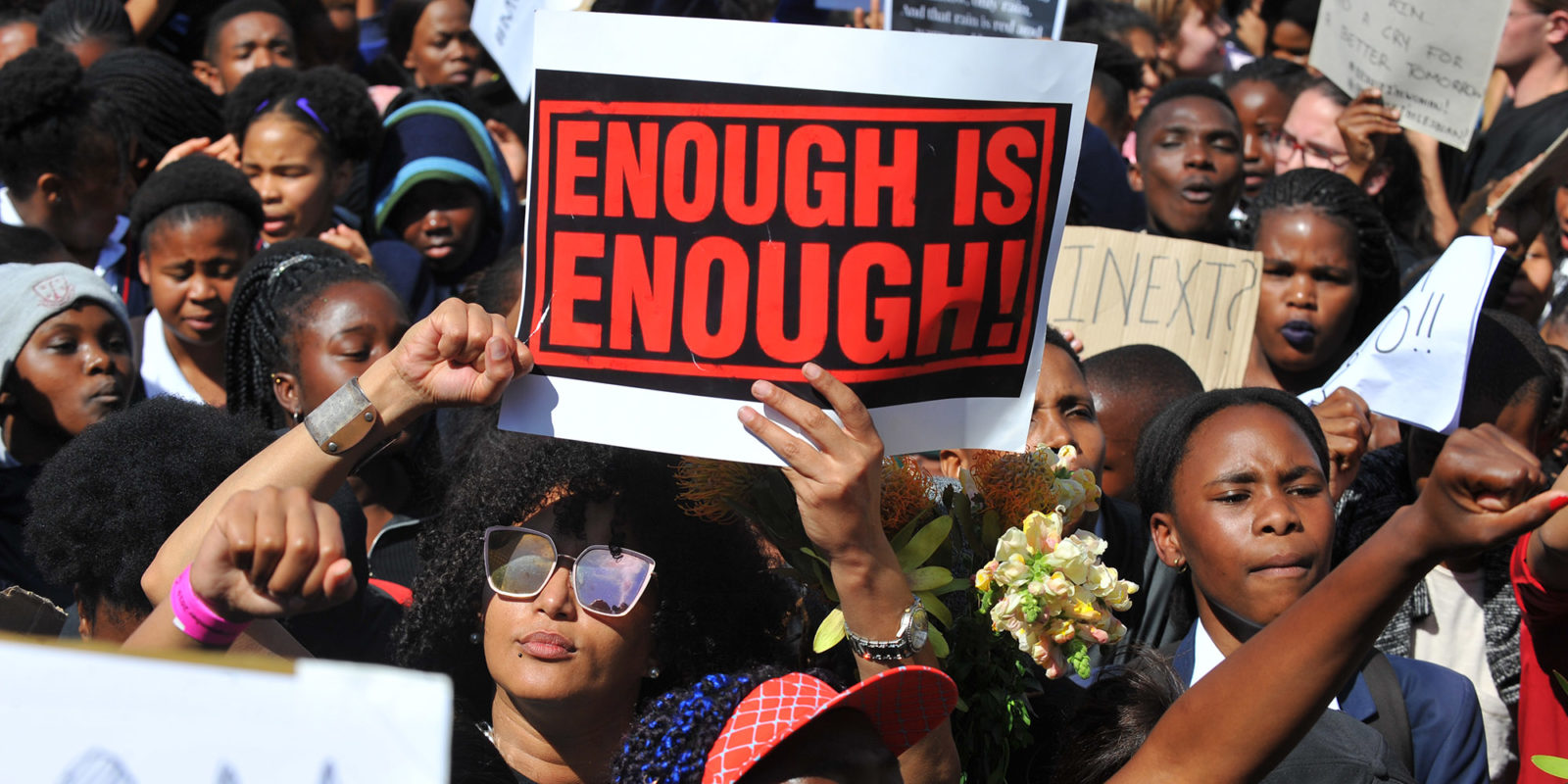
One of the unique features of South Africa’s Constitution is the role that it assigns to citizens in ensuring accountable government. We are a ‘participatory democracy’, one where active citizens play a role in ensuring that Parliament and the executive (at every level of government), fulfill the Constitution’s promise of social justice.
The exercise of people’s power in South Africa keeps a focus on the rights to equality and dignity of tens of millions of people who were disadvantaged by 300 years of colonialism and then apartheid. To this end, we are fortunate that we have a vibrant and mostly independent civil society, made up of thousands of organisations, who use advocacy, research, protest, policy development and myriad other means to campaign for human rights.
Recently, Maverick Citizen contacted over 20 social justice organisations to ask them about their priorities for 2020 and how they feel about the year ahead. We focussed on organisations who campaign for good governance and against corruption; for economic justice, budgetary and fiscal policy that fulfills constitutional duties to realise the rights of poor people; for women’s equality rights; and organisations that campaign for specific socio-economic rights such as health, education and transport. We also looked at the critical issue of the climate crisis.
We found that all of the organisations have a sober view of the challenges facing South Africa. Many expressed a growing impatience and frustration with both the government and the private sector, where fine words about equality and respect for human rights are not often matched by action. Others are angry that two years after civil society mobilised and helped to expose, and then arrest state capture, there is little evident progress, or prosecutions in bringing the corrupters to justice.
This is what they had to say.
Campaigns against corruption and for good governance and accountability:

During his Christmas sermon last year, Archbishop Thabo Makgoba called for 2020 to be the “year of the orange jumpsuit”. The call for those implicated in state capture to be brought to book is important for advancing social justice in our country. The actions of those who looted from state coffers and re-purposed the state for their own ends, has been a primary factor in derailing efforts aimed at transforming our society, and delivering on the promises of economic justice and efficient governance.
The archbishop’s call ties in with efforts by civil society and government in recent months aimed at strengthening, and resourcing the criminal justice system and ensuring its independence, something which will continue into 2020.
It is also reinforced by the efforts being made to encourage and protect whistleblowers, and rally behind honest public servants and representatives, who challenge corruption and state capture.
Civil society simultaneously needs to take a proactive approach to addressing the problem of state capture. There is a need to develop ways of strengthening parliamentary oversight and the ability of Parliament to hold the executive to account. Ideas on electoral reform should be considered in this regard.
This year, civil society should also be demanding greater transparency around political party funding and full compliance to the Political Party Funding Act, especially leading up to the 2021 local government elections.
In light of the elections, this year should also be about ensuring that capture and corruption at municipal, and provincial levels comes under the spotlight.
State capture is not a thing of the past and avenues for looting remain open. Key to preventing this is developing policy proposals for reform in areas such as governance at SOEs, around appointments and dismissals of public servants and those heading Chapter 9 institutions, as well as around public procurement.
Underpinning all this work is the need for an active citizenry that is aware of what is at stake if efforts to reform the country fail. 2020 will be a battleground of ideas and perception, as those behind the state capture “fight back” continue to use the networks that they established over the years to undermine reform efforts and absolve themselves of any accountability, by engaging in campaigns of disinformation.
Last year, the AKF and the Public Affairs Research Institute hosted a civil society conference where the areas outlined above, were considered to be focal points of action and mobilisation this year. What was clear from this conference, was that 2020 will demand higher levels of vigilance and energy in the defense of our democracy, the strengthening of broad fronts to confront the state capture “fight back”, and long-term thinking to instate mechanisms to prevent future capture. – Executive Director, Neeshan Bolton.
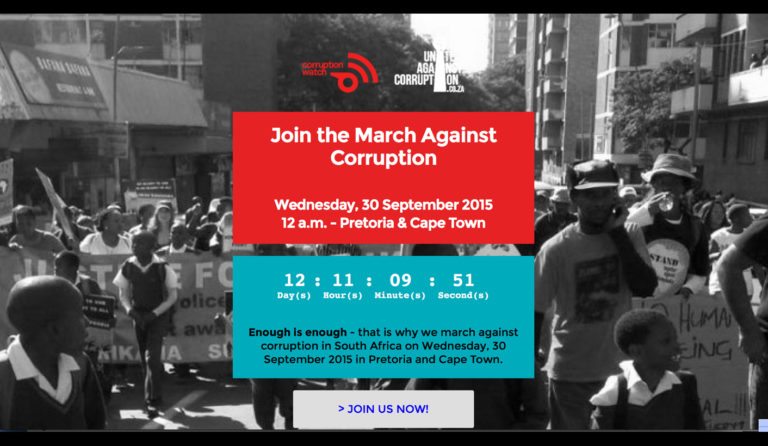
Corruption Watch is part of a multi-sectoral group that aims to finalise the much needed National Anti-Corruption Strategy.
In mid-2020 we will be launching an innovative “Know Your Police Station” tool which will allow members of the public to:
- Report incidents of corruption and police misconduct;
- Access interactive heat maps of police corruption trends and hotspots;
- Access information pertaining to an individual’s rights when they encounter police;
- Access information pertaining to the location, budget, resource allocation and personnel at all 1,100 police stations across the country;
- Rate and review police stations based on individual experiences; and
- Nominate an ethical cop based on individual experiences.
We will be paying close attention to the appointments of the Executive Director of IPID, as well as the Auditor-General.
As a member of the Health Sector Anti-Corruption Forum, we will continue to work with law enforcement and other stakeholders to probe cases of corruption in both the private and public health sector, as well as develop meaningful interventions to prevent the widespread looting in this space.
In terms of our research agenda, we will be releasing a short report on corruption in the public health system; a detailed study on the levels of transparency in various private sector companies; as well as a report on how corruption impacts women in South Africa. – Head of Stakeholder Relations and Campaigns, Kavisha Pillay.
Council for the Advancement of the South African Constitution (CASAC)

In the wake of the successful efforts by civil society and the media to expose the extent of state capture and the near-destruction of institutions of governance, we must now confront a new series of challenges.
In particular, we must ensure that the process of rebuilding the capacity and institutional integrity of key institutions continues, and that accountability and openness become the order of the day. These include Parliament, the National Prosecuting Authority, the Hawks as well as the Office of the Public Protector, and state-owned enterprises.
Having been in defensive mode for some time, we now need to get on to the front foot and prioritise the realisation of the constitutional vision of a society that respects and promotes human dignity.
We must ensure the progressive realisation of socio-economic rights in particular so that we tackle the huge inequalities in our society. In doing so, we must ensure that people generally, and especially those on the margins of society, are properly empowered to exercise and claim the rights to which they are entitled; this will involve extensive programmes of civic education by government, business, labour and the civil society sector. – Executive Director, Lawson Naidoo.
Organisation Undoing Tax Abuse (OUTA)
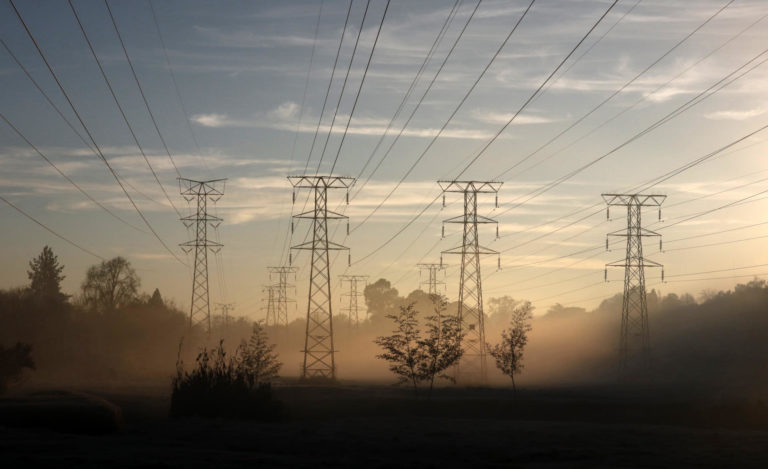
Power cables from the state run power provider Eskom are seen running through the morning mist in Johannesburg, South Africa, 18 June 2018. The countries only major power supplier has been experiencing power cuts over the past days due to an ongoing wage related strike. As winter takes hold over the country the usage of power has risen partly causing the power outages EPA-EFE/KIM LUDBROOK
This will be a good year for civil activism with the activity of many years of hard work starting to bear fruit!
We believe 2020 will be a year when the NPA and meaningful prosecutions by the NPA unfold against the kingpins of state capture corruption. We believe the NPA, SIU and others are close to completion on a number of strong cases against the once powerful and politically connected elite.
This is also the year that civil society pressure brought to bear against Busisiwe Mkhwebane will see her removal as the Public Protector (PP). OUTA laid perjury charges against the PP in 2019, which appears to be being taken seriously by the authorities.
Feedback from engagements in Parliament’s Portfolio committee sessions give us confidence that the oversight mechanisms in Parliament are starting to take their role more seriously.
In mid-February, OUTA will launch and be distributing its “Handbook for Effective Government” to MPs.
OUTA will be improving it’s project management processes and structures to take on more, as well as expand its work in policy and advocacy to influence and drive the government for more efficient and workable policies for SA.
AARTO is a big project we are involved in and unless government changes tack on this cumbersome and unworkable situation, this scheme will fail as e-tolls have.
On the topic of e-tolls, we believe the plugs will finally be pulled on the scheme in February 2020. – Wayne Duvenage, Executive Director.
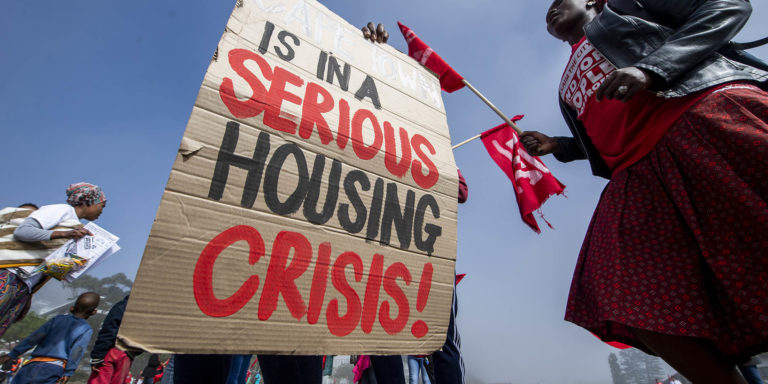
A promise by former Western Cape MEC for Human Settlements Bonginkosi Madikizela of 10,000 inner-city houses in Cape Town has been dismissed as an election ploy. (Photo: Jaco Marais / Gallo)
Cape Town needs functioning safe and reliable trains. The collapse of even a basic service due to criminal syndicates, corruption and incompetence at PRASA affects everybody every day and it is getting worse.
We don’t just need a solution to this crisis – we need a long-term vision to restructure this broken city. But everywhere we look we see incompetence, indifference and a lack of political will.
The truth is that no new public housing has been built in a well-located area since the end of apartheid and government at all three spheres seemingly cannot get this right.
Apart from two long-planned social housing projects in Woodstock, the City under Mayor Dan Plato has rolled back on every commitment to build affordable housing on good public land while new relocation camps are established for evictees.
Residents living in informal settlements remain locked in decades long limbo without security of tenure, while the City rolls over leases of our best public land, including the Rondebosch Golf Course, for the exclusive use of a few wealthy people.
The province has done no better under Premier, Allan Winde. His government continues to fight for the right to sell public land to the highest bidder while denying that the obligation to advance spatial justice is binding.
The national government, despite owning the largest parcels of land, is all but absent in Cape Town. Patricia de Lille, now National Public Works Minister is holding the best land ransom to settle old scores with her former colleagues. It’s unforgivable.
2020 is the year that the redistribution of urban public land must take centre stage. We need binding legislation that empowers communities to challenge the way land is used; compels government to actively review and redistribute land; and governs how this can be done in a sustainable, just and equitable way. The redistribution of land must be an administrative decision, not left to the whims of politicians. – Reclaiming the City Steering Committee.
Public Affairs Research Institute, (PARI)
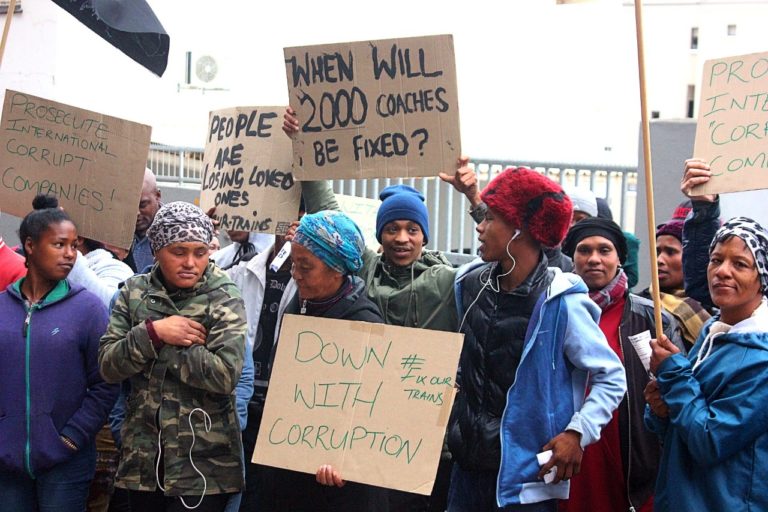
A #UniteBehind protest at multi-national companies in Cape Town in July 2019. #UniteBehind activists were demanding that German companies that were implicated in state capture at PRASA be held accountable. Photo: Matthew Hirsch
We are ready for a roller-coaster ride. However, there are strong signals of important reforms. The ANC lekgotla seemed to signal the right direction on SOEs, but the question is whether it’s for real or just more talk.
What we are discovering is that state institutions are in a worse state than we thought. They don’t have the capacity. They are hampered by the lack of resources, but also by tenure and job security for bad people who were put in during the state capture era, not necessarily the leaders, but people lower down. So there’s a need to concentrate on nuts and bolts as much as on individual leadership.
PARI and our partners are in the process of forming an Alliance for State Reform, which we plan to launch early this year. We have prepared some critical research papers, which will also be launched, on issues like Reform of Public Procurement and Reform of Criminal Justice Institutions. We need an open conversation about this, including with public servants. We think it’s important that we have a memorandum of understanding with the South African Local Government Association (SALGA) and we are jointly establishing a research centre.
Finally we are looking into issues of land reform. We are concerned about a possible trend of townships being established on traditional land, rather than municipal land. What are the implications of this? How does it relate to the Traditional Khoisan Leadership Act, which was signed by President Ramaphosa last year and gives greater powers over land to traditional leaders Bill? These are questions we are analysing. – Mbongiseni Buthelezi, Executive Director .
Public Service Accountability Monitor (PSAM)

A 100 South African Rand banknote stands in this arranged photograph in London, U.K. Photographer: Simon Dawson/Bloomberg
The Public Service Accountability Monitor (PSAM) operates in the SADC region with its plans focused primarily on South Africa, Zimbabwe, Zambia, Mozambique, Malawi and Tanzania.
In 2020, the PSAM will engage governments and legislatures, so as to support civic and state action that builds more participatory, responsive and accountable governance systems.
The PSAM vision is to see an increased number of SADC countries displaying accountable governance that leads to improved quality of life, especially for the most poor and marginalised of communities. We are doing this through research, direct advocacy, capacity building and convening via PSAM’s Rhodes University accredited training and targeted multi-stakeholder workshops.
The PSAM will support collective efforts to build more accountable, inclusive and capable states in Southern Africa. This will include work to strengthen co-creation initiatives and learning platforms such as the Community of Practice for Social Accountability Monitoring (COPSAM).
Being a steward of the Global Initiative for Fiscal Transparency (GIFT) and a research contact point for the April 2020 release of the results of the biennial Open Budget Survey, the PSAM will continue to support efforts to promote budget transparency, good governance and accountability in Southern Africa and further afield. – Jay Kruuse: Director Public Service Accountability Monitor
Campaigns for economic justice and pro-poor budgetting:
Institute for Economic Justice (IEJ)

Illustrative image | source: Adobestock
I think civil society must be prepared for the fact that economically things are going to get worse and this will impact heavily on campaigns for constitutional rights. The chickens are coming home to roost from the era of corruption, state capture and conservative economic management.
Sadly, in response there is no coherent economic roadmap from the government, except perhaps more austerity which will have a terrible toll on our social fabric. Tito Mboweni’s proposals, for example, are internally incoherent and conflict with other areas of government policy. – Gilad Issacs, Co-Director
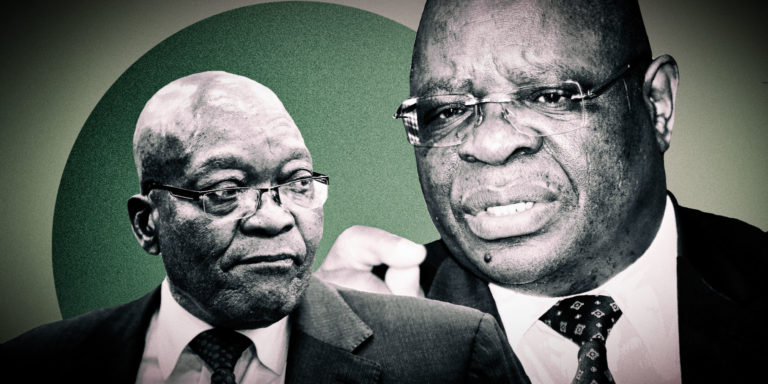
Former president Jacob Zuma, left, and Deputy Chief Justice Raymond Zondo. (Illustrative image sources: 2019 Tiso Blackstar Group / Thulani Mbele | Financial Mail / Freddy Mavunda)
At Open Secrets, we believe that focusing on wealthy private actors is crucial to promoting social justice. In April 2020, the nation will be focussed on the corruption trial of Jacob Zuma and his co-accused at the mega French arms company, Thales. These two alleged corrupt actors are an important tip of the arms deal corruption iceberg.
The likely extension of the Zondo Commission is an opportunity to drill down into the role of the many private sector enablers of economic crime (the doctors, lawyers, auditors and slippery consultants). We will also push hard to ensure that the profiteers of apartheid economic crime as well as the corporations who have withheld pensions from over four million poor South Africans are held to account.
Lastly, we need to reinsert the focus of human rights in our foreign policy – especially with regards to the conduct of corporations selling arms that are likely killing civilians in war zones. In 2020, we need to reassert international solidarity with those who suffer human rights abuses in South Africa and elsewhere as a way of challenging the forces of nationalism, populism and profit. – Hennie van Vuuren, Director Open Secrets.

Our primary aim as the Budget Justice Coalition in 2020 is to show that there are alternatives to this “death by a thousand cuts” scenario.
It is a great injustice that the democratically elected government is making ordinary people pay the price for the failures of our economic and political elites, through reduced services, longer waiting times, and delayed improvements to their lives, such as school infrastructure.
We aim to show a conservative National Treasury how to follow the rest of the world in breaking free of the neoliberal macroeconomic straight-jacket. This means the economic machinery of the state: the Treasury, Reserve Bank, Department of Trade and Industry and others working much closer together to ensure that fiscal policy, monetary policy (interest rates) and trade and economic policy operate together much more effectively.
We need to ditch the dogma that many high-ranking government officials were taught at school in the 1980s and move in the 2020s, where everyone from the International Monetary Fund to the World Bank has acknowledged that dealing with inequality is a prerequisite for sustained economic growth – not the other way around. We will also continue to engage with Parliament on budget formulation and execution, as well as with other oversight institutions and mechanisms, such as the Auditor General’s office and the Finance and Fiscal Commission. – Daniel McLaren, BJC Steering Committee member.
Campaigns for women’s rights:
Sisterhood Movement
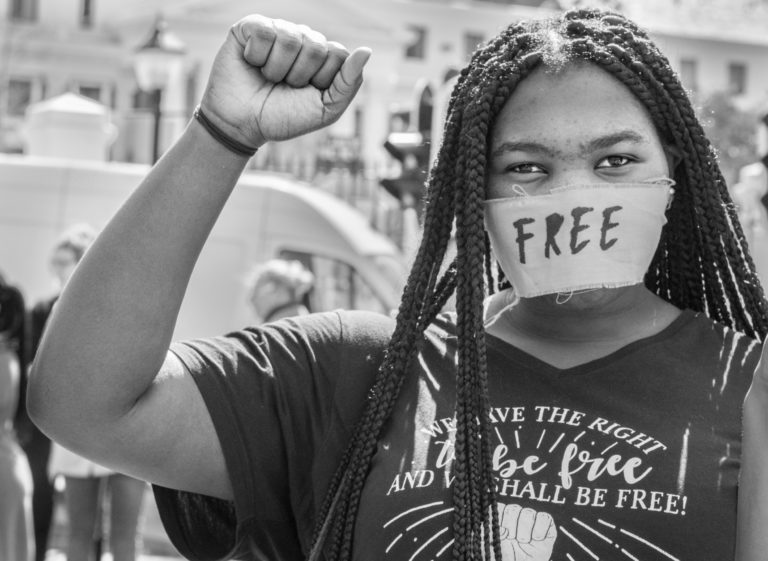
Thursday 06 September 2019, March to Parliament (Photo: Nicky Newman)
We want to see a more caring South Africa!
Firstly, the past two decades reversed the goals that we set out for ourselves as South Africans and our dream of a free, equal South Africa is being eroded everyday. We should take stock this year and buckle up for the steep journey of rebuilding our country. As the reality dawns on us that more and more resources to do such an ambitious project are rapidly being depleted due to us tolerating a corrupt culture where graft and using public resources for private gain has become normalised in the public and private sector alike, resulting in the private good instead of the higher public good as the norm. 2020 should be the year and decade where we strive and move away from focusing on the interests and needs of the few to restore the dignity of the majority, which includes unemployed youth, rural people and young and older women. They need to be targeted for development and empowerment interventions now more than ever to redress the stark imbalances of the past.
Given where we are, we need to move away from a knee jerk response of survival of self and immediate family only to restore our ubuntu, our culture of caring and compassion for each other, lending a helping hand to the unemployed, poor women and youth. This can no longer be seen as welfare as our economic situation has become more dire and serious. This shift is urgent as the envelope in our national budget for meeting social and economic needs of citizens has severely shrunk as almost half of our budget goes to debt servicing.
The burden of caring falls mostly on women who are bearing the brunt of all social ills and government support thus becomes leaner in reality. We need to protect, respect and promote the rights of vulnerable groups such as young women and girls whose place in the sun has been compromised with the severe impact of systemic injustices of patriarchy and structural racism having them at the receiving end of a culture of domestic institutional and physical violence impacting on their ability to access opportunities to improve the quality of their lives.
While we were fighting poverty and two undemocratic states over the past decades, 2020 beckons for us to become truly mindful that our goals of equality and justice for all will not be realised unless we take care of our mother earth who hosts the environmental infrastructure and natural resources that we depend upon for survival and livelihood of current and future generations. Expanding this consciousness among South Africans is no longer only the privilege of the elite, but a necessity for the survival of all living beings including people, animals, plants, fertile land, water and other natural resources. Each South African has to give up something we have treasured and owned so that the needs of all who live here including vulnerable groups such as orphans, refugees, the elderly, girls and women at risk and cared for and their lives restored on the path of regeneration and restoration of dignity for all. – Founder, Vainola Makan
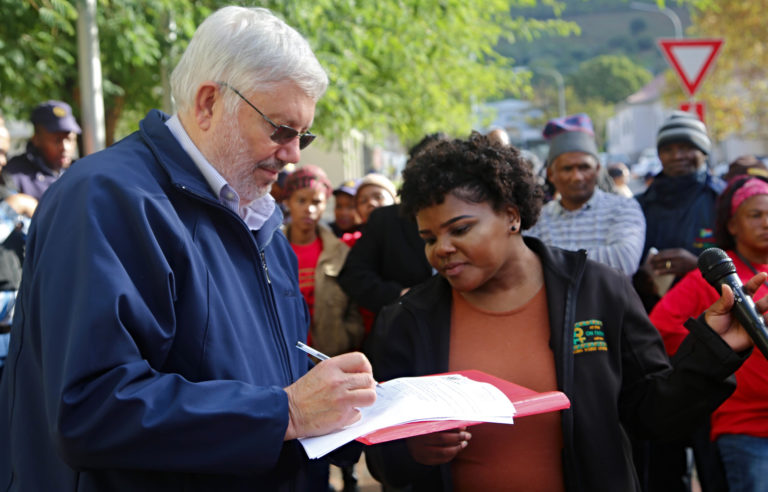
Carl Opperman, CEO of Agri Western Cape, signed the list of demands handed over to him by Women on Farms. Photograph taken at Agri Western Cape in Paarl on 29 May 2018.
There continues to be an evictions crisis facing farm workers and dwellers. In 2018/19, there were about 1,200 evictions on the court roll in the Drakenstein Municipality alone, which will translate into 20,000 evictions when the court grants the evictions.
Although the Drakenstein Municipality is widely regarded to be the evictions “hotspot”, such evictions are taking place in all commercial farming areas. WFP noted a definite spike in evictions in 2018/19, which coincided with the national discussion on land expropriation without compensation (LEWC). Farmers are clearly taking pre-emptive action against farm workers and dwellers before LEWC is finalised.
A related, and growing, phenomenon, that we have observed in the Simondium, Franschhoek, Paarl and Stellenbosch areas is the increasing number of luxury residential, lifestyle and tourist developments, which are not only leading to the eviction of farm dwellers, but form part of a systematic project to get rid of all farm workers and dwellers, thereby turning these areas into (largely) white, wealthy enclaves.
Thus, WFP will engage in an anti-eviction campaign, including calling on the President to honour the moratorium on farm evictions promised to farm workers in 2014. At the same time, we will engage with all LEWC processes, especially enabling women’s participation; specifically, we will be calling for expropriated land to specifically be redistributed to women farm workers and dwellers. In the meantime, we will argue that there is already “low hanging” fruit – i.e. certain tracts of land (including land lying fallow and unused for decades) that can already be expropriated for farm workers and dwellers, especially women. – Director, Colette Solomon.
Campaigns to fulfill socio-economic rights:
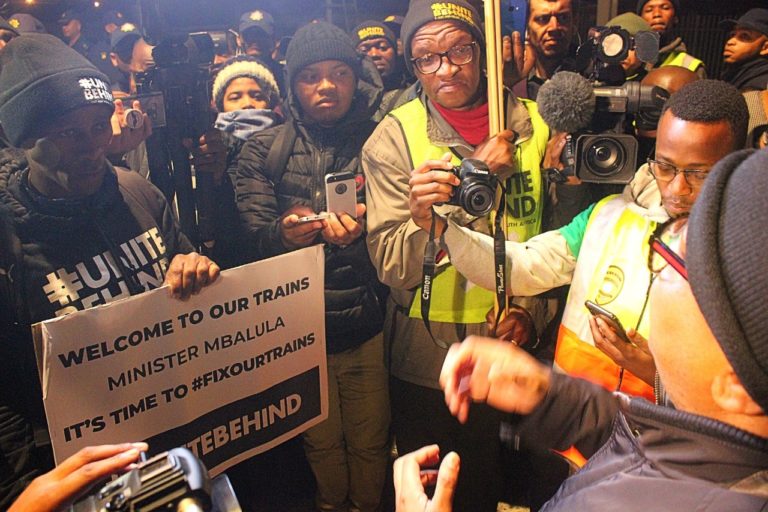
#UniteBehind activists met with Minister of Transport Fikile Mbalula when he visited Khayelitsha in June 2019. Members handed over our demands to the Minister.
In 2020, we need to fix our trains.
In order to achieve this, we need: a national transport disaster to be declared; a commuter-centred safety plan from PRASA; the central line, which has been closed since 2019, to be re-opened; qualified security guards at all trains and stations; stable and ethical leadership at PRASA, with a permanent board the highest priority; alternative transport, among a host of urgent actions.
We need those responsible for corruption and state capture at PRASA to be prosecuted and for their assets to be seized. We want the multinational companies who have facilitated state capture at SOEs to be held accountable.
#UniteBehind will continue to act in the interest of the poor and working class commuters who suffer the effects of state capture every day. In 2020, #UniteBehind will develop and publish a People’s Plan for our trains and public transport. – Organiser, Zukie Vuka.
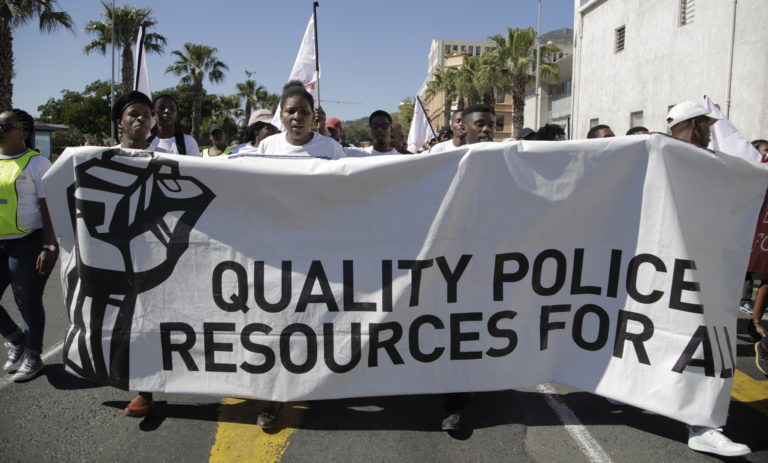
Members of the Social Justice Coalition march through the streets of Cape Town on 11 September 2018 over police resources and crime statistics which were being released in Parliament. Photo: Leila Dougan
The SJC will continue to focus on the delivery of basic services to informal settlements and to ground politics, budgets and political rhetoric in the real world and responsive to the needs of poor, working-class communities. We will continue to fight for safety resources (police officers, public lighting, CCTV cameras, convictions in gender-based violence cases), for sanitation services and for the incremental upgrading of informal settlements.
We’ll do this by challenging unjust budgets that leave communities who are most in need under-serviced and by ensuring that limited resources are allocated in a just and rational manner. Our work will be grounded and focused on building real people’s power through progressive, non-partisan political organising.
In 2020, the Equality Court will decide on the remedy required to address the discrimination on the basis of race and poverty reflected in the allocation of police resources, that the court found in December 2018. As one of three applicants in the case, alongside Equal Education and the Nyanga Community Police Forum, the SJC will ensure that the remedy determined by the court is implemented. This will ensure that communities across the country carrying the highest burden of violent crime get the police resources they need.
In 2020, the SJC also expects our case in the Equality Court, challenging the lack of a reasonable sanitation plan in the City of Cape Town, to be resolved. – General Secretary, Axolile Notywala.
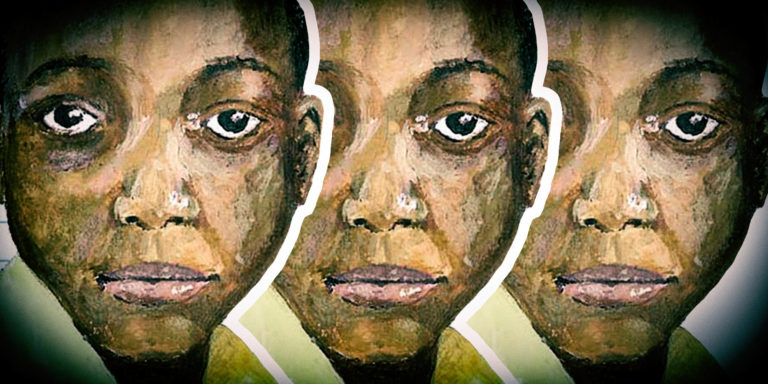
Illustrative image | source: Michael Komape (image: Section 27)
Our key focus on the right to health this year will be to ensure that the National Health Insurance (NHI) is responsive to the needs of the majority of people.
In relation to the right to access basic education, we will continue to focus on fixing sanitation in schools so that no more children have to die in pit latrines. School safety has become an urgent issue to be addressed, in relation to this, we will be engaging with the Department of Basic Education on this issue in addition to ensuring that the scholar transport policy makes adequate provision for learners with disabilities in KZN. – Executive Director Umunyana Rugege.
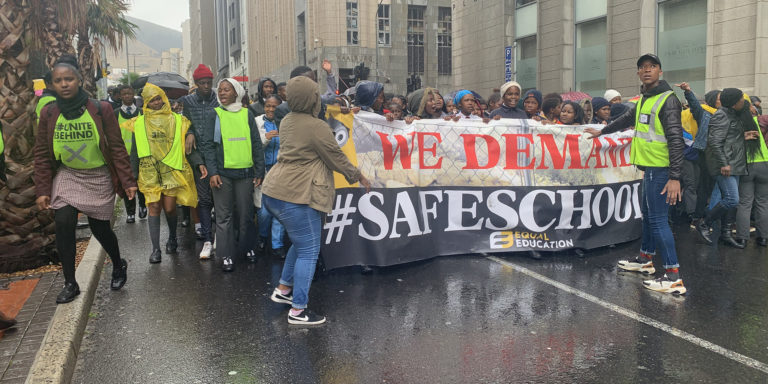
Equal Education marches for safer schools to the Provincial Legislature on 25 October 2019. Photo: Karabo Mafolo
This year, a large part of our focus will be dedicated to advocating for the Department of Basic Education (DBE), and the various provincial education departments, to comply with the 2020 deadline of the Norms and Standards for Public School Infrastructure (Norms and Standards). This legally binding 2020 deadline demands that there is:
– An adequate supply of classrooms, electricity, water and toilets;
– Perimeter security (fencing, burglar bars, security cameras); and
– Electronic connectivity (internet access, phones, intercoms).
Through the People’s Performance Contract that EE members drafted for Basic Education Minister Angie Motshekga, we stipulated the priorities for the sixth administration. These include that Minister Motshekga must:
– Hold the the KwaZulu-Natal Education MEC accountable for the failure to release a provincial scholar transport policy;
– Publish a national plan with details of concrete steps to address the prevalence of violence on the way to school and inside schools; and
– Roll out interventions that are proven to improve the teaching and learning of reading in the foundation phases.
We are keeping a close watch on education privatisation, and attempting to ensure that the rights of learners to education and the best interests of children are paramount. The involvement of private actors in education has recently extended to the governance and management of public schools.
Finally, in 2020 we will launch our Charter for an Equal Education. This Charter will speak to the movement’s belief that education is a public good and should not be exploited for profit. – General Secretary, Noncedo Madubedube.
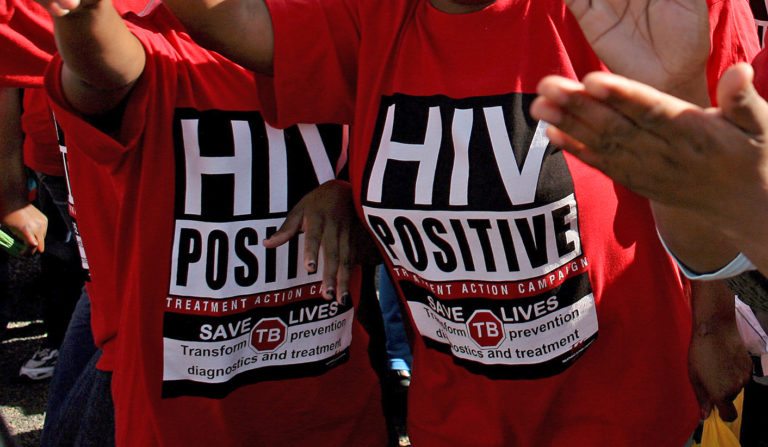
In 2020, TAC will be prioritising the following key areas: monitoring the HIV and TB response, health systems strengthening, access to affordable medicines, and building local and international activism.
We will continue to advocate for universal health coverage, while constructively highlighting the flaws in the current NHI Bill, in order to decolonise health services and provide quality and adequate healthcare services for all, irrespective of financial status.
TAC will be focusing on building both local and international activism by mobilizing our 8,000 strong membership every day to advocate for the rights enshrined in the Constitution, taking on private and/or public power where necessary and working in partnership when objectives are intertwined. – Anele Yawa, TAC General Secretary.
Campaigning for action on the climate crisis:
The Climate Justice Charter Process

Swedish environment activist Greta Thunberg attends an event with scientists at the COP25 Climate Conference on December 10, 2019 in Madrid, Spain. The COP25 conference brings together world leaders, climate activists, NGOs, indigenous people and others for two weeks in an effort to focus global policy makers on concrete steps for heading off a further rise in global temperatures. (Photo by Pablo Blazquez Dominguez/Getty Images)
The draft climate justice charter for South Africa was born out of five years of grassroots campaigning led by the South African Food Sovereignty Campaign (SAFSC). The Cooperative and Policy Alternative Centre, a vibrant alliance partner of the SAFSC, championed and co-founded the climate justice charter process in this context. Last year out of dialogue with drought affected communities, media, labour, youth, social and environmental justice organisations we produced a draft Climate Justice Charter for South Africa.
During 2020 the following is envisaged around the CJC process:
- Solidarity actions with drought affected communities, school children and labour.
- Deepening of grassroots input into the charter in communities and from organisations. The draft charter will also be put online as a google document for public comment. The period of public comment and input will end on 1st May, 2020.
- A finalised document will be issued for endorsement by the end of May by individuals and community organisations. Community assemblies will be convened to secure endorsements from June to the end of September. Prominent South Africans will also be engaged for public endorsements. A register of endorsees will be developed.
- By mid-October the Climate Justice Charter will be taken to parliament and proposed for adoption as per section 234 of the South African constitution. A Climate Justice Camp outside parliament will assist with the build up to the hand over of the charter and the list of endorsees. A national march to parliament is envisaged.
- The South African Climate Justice Alliance and national forum will be launched out of these engagements. – Board Chair of the Cooperative and Policy Alternative Centre, Vishwas Satgar.
The South African Faith Communities Environmental Institute (SAFCEI)
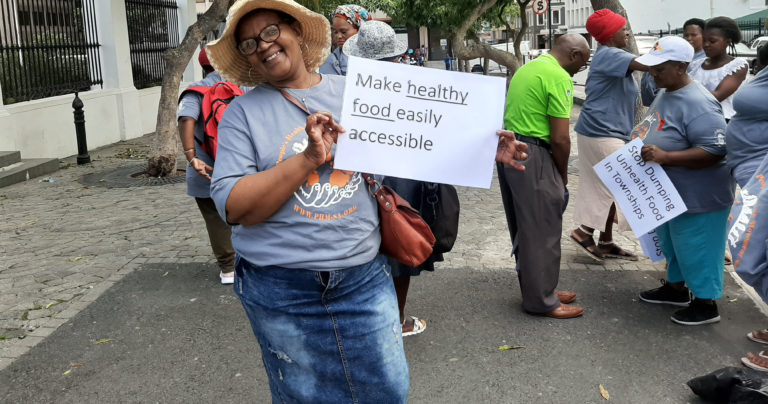
Mavis Manqola stands with her poster as she supports the People’s Health Movement to help raise awareness on the lack of access to healthy food in poorer areas. PHOTO: Lia Snijman.
SAFCEI, The South African Faith Communities Environmental Institute, is committed to working with faith leaders in addressing issues of eco-justice, energy justice, food sovereignty, climate change and animal justice.
2020 holds the possibility of real change in South Africa and SAFCEI is optimistic that real change is imminent.
Even with the recent release of the updated Integrated Resource Plan (IRP), South Africa’s energy future is complicated and unclear. SAFCEI will continue to work against the implementation of expensive, environmentally harmful and dangerous nuclear power in South Africa (and into the continent).
In 2020, SAFCEI will also work with faith leaders to address the complications of a food system that does not provide adequately for the most vulnerable in our society, and how this would affect climate change. The welfare of other sentient beings is also of great concern to SAFCEI and special attention will be given to the inhumane treatment of egg-laying hens who are living in battery cages on factory farms.
SAFCEI, with other civil society partners, will also continue to contribute to the facilitation to a just transition to renewables from fossil-based fuels in South Africa’s energy system. Extensive work will also be done to capacitate and educate faith leaders about the environmental dangers of Africa’s association with nuclear power. – Francesca de Gasparis, SAFCEI Executive Director.
All of the campaigns above need public support. We have provided links to each organisation and urge readers to contact organisations working on issues that affect, or concern you and ask how you can volunteer, or assist. MC
By Mark Heywood Estelle Ellis Zukiswa Pikoli Anso Thom | Source: Daily Maverick
Recent Posts
- Can we afford NOT to have a BIG in South Africa? – Podcast
- Joint Stakeholder Submission on the Right to Adequate Standard of Living in South Africa
- SPII’s Contribution – Submission to UN CESCR
- Political Elites Must Break Ranks to Crush Poverty, Inequality
- Podcast: High Price to Pay for the Rising Cost of Living
- More People Believe They Are Living Under Poverty in South Africa
- Nkululeko Majozi Speaking on Subjective Poverty in South Africa
- Podcast: In The Ring With Eusebius McKaiser – Can we afford a Basic Income Grant?
- Extending the Social Relief of Distress grant is not enough to alleviate plight of poor, says civil society
- Global Basic Income Grant Pilots Since 2000











